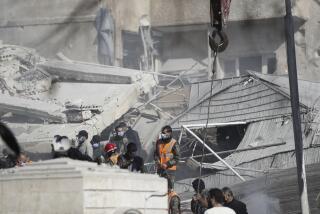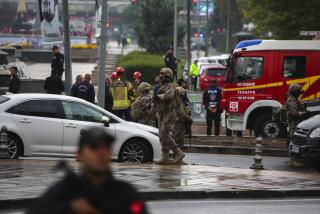Iraq suicide truck bomber kills 5 U.S. troops
- Share via
MOSUL, IRAQ, AND BAGHDAD — A suicide truck bomber attacked a police headquarters Friday in the tense northern city of Mosul, killing five U.S. soldiers in the deadliest strike against American forces in Iraq in 13 months.
The bomber got around several concrete barriers and detonated his truck loaded with explosives at the entrance to the local headquarters of Iraq’s national police.
A U.S. military convoy passing at the time provided the bomber with a “target of opportunity,” said U.S. Army spokesman Maj. Derrick Cheng. In addition to the U.S. troops, three Iraqis were killed: a soldier, a policeman and a civilian. Sixty people were injured, police said.
On a surprise visit to Baghdad this week, President Obama touted security gains in Iraq. He said it was time for Iraqis to take full control of their country, in keeping with plans to pull U.S. combat troops out of cities by June 30 and for all combat brigades to leave the country by August 2010.
However, Baghdad residents have been rattled by a recent increase in violence, raising concerns that the capital could slide back into chaos. On the day before Obama arrived, six car bombings in Baghdad claimed the lives of 36 people.
Mosul and surrounding areas have not seen even relative peace, and U.S. troops are increasingly called on there to try to prevent outbreaks of violence. On any day, Mosul is rocked by bombings against its civilian population. On Friday, a Sunni Arab politician who had lost a local election in January was assassinated on the street.
The explosion at the police compound sent glass flying, destroyed five armored vehicles and burned two other U.S. vehicles, Iraqi security sources said.
“We heard a loud explosion that shook the neighborhood and we heard the sound of breaking glass,” said Bassam Younis, 47, who owns a grocery store in the area.
Many of the wounded Iraqis were civilians who live in neighboring houses. Security forces sealed off the area and helicopters roared overhead, while smoke filled the sky. Two people were arrested, the U.S. military and Iraqi security officials said.
It was the second truck-bomb attack in two weeks against a national police base in Mosul. Eight people were killed March 31 when a suicide bomber entered a different base. His forged papers said he was carrying construction supplies.
The latest bombing raised to 4,271 the number of U.S. soldiers killed in Iraq since 2003. But the pace of killings has slowed dramatically in the relative calm that followed a troop buildup in 2007. Last month, nine U.S. troops were killed.
The last time five died in a single combat incident in Iraq was in March 2008, when a suicide bomber attacked a foot patrol in Baghdad.
Mosul, capital of Nineveh province, and Diyala province to the east remain rife with tension and are still considered dangerous.
Nineveh has long been burdened by Kurdish-Arab strife. Since 2003, the two main Kurdish parties in Iraq have dominated the province’s political life.
Arabs, who initially rejected the U.S.-sponsored political process, are now seeking to assert their will after winning provincial elections.
Kurds and Arabs are bickering in particular over areas north of Mosul, which Kurds contend should be annexed to the semiautonomous Kurdistan region. The rival groups are grappling with the legacy of Saddam Hussein’s policy of displacing Kurds to create an Arab majority in the region. Kurds seek to correct what they view as a historical wrong; Arabs see themselves as being humiliated.
The Sunni insurgency also is founded on the alienation of former higher-ranking military commanders, who were marginalized in the first years after the U.S.-led invasion.
Such frictions are playing out along a 300-mile “green line” that separates the rest of Iraq from the Kurdish region. The U.S. military is increasingly playing the role of mediator to avert greater violence.
The senior U.S. commander in Iraq, Army Gen. Ray Odierno, suggested in interviews that combat troops could stay on in Diyala and Nineveh’s cities after June 30.
But the role of combat troops still needs to be formalized by the Iraqi and American sides. U.S. generals have contended that some combat forces could remain in cities as long as their mission is defined as advising and training Iraqi forces.
Sectarian and political tensions are rampant in much of Iraq. Sunni Arab paramilitary fighters are under pressure from the Shiite-led government, and there are concerns that some of them could be recruited back into the insurgency that raged before 2007.
Their decision to ally with the U.S. and oppose the militant group Al Qaeda in Iraq was credited with helping calm the country. But the government has now jailed some of the paramilitary leaders, and many fighters think the U.S. is not doing enough to protect them.
--
Ammer is a special correspondent. Times staff writer Saif Hameed contributed to this report.
More to Read
Sign up for Essential California
The most important California stories and recommendations in your inbox every morning.
You may occasionally receive promotional content from the Los Angeles Times.










